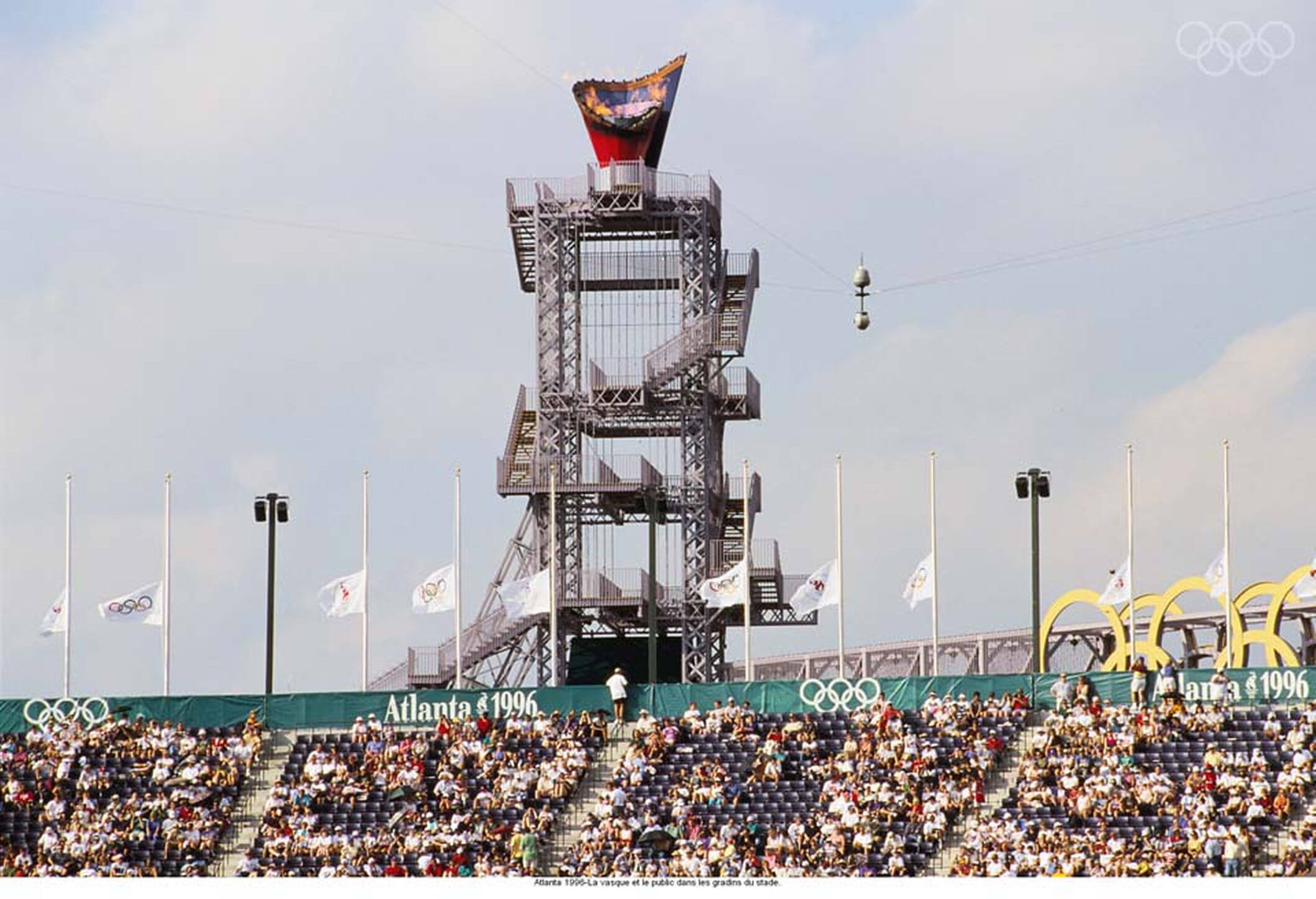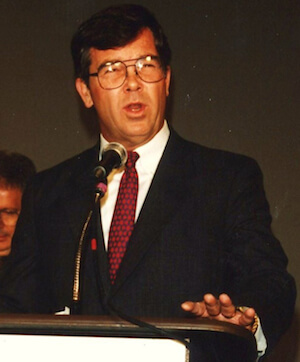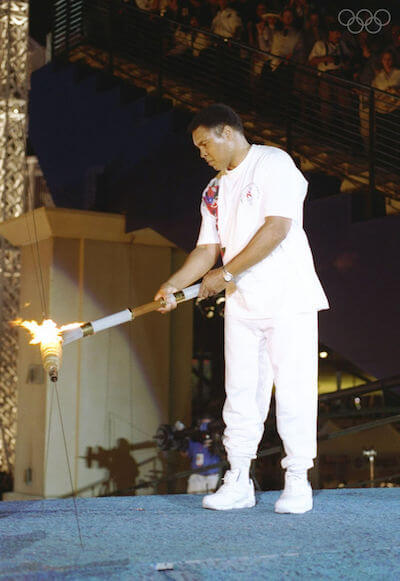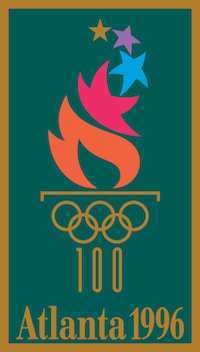The Birth of the 1996 Atlanta Olympic Games

As the 2016 Olympic Games continue in Rio de Janeiro, Brazil, and historic records are broken in the pool, on the court, on the field, and on the track, we’re inclined to remember Olympics and Olympic athletes of yore. The history of the modern Olympics games includes a cadre of characters - both nations and individual athletes - that have not only brought the Games to the international pedestal they sit on today, but also pushed others to live up to the ideals of the Olympic spirit (for better or for worse).
Since 1896, the Olympic Games have traveled the globe - visiting the world’s greatest cities for a two-week athletic symposium - showcasing the world’s greatest athletes competing for the highest honor in their sports: an Olympic gold medal. For the centennial celebration of this international event, the world descended on Atlanta, Georgia - a bustling metropolis in the American Southeast. Atlanta was given a tall order: to not only represent the United States of America on the world’s biggest stage, but also honor the hundredth anniversary of one of the world’s most popular and celebrated events.
But Atlanta was no stranger to large-scale projects. This was a city that had rebuilt itself from the ground up after Union General William Tecumseh Sherman burned it to the ground as he carved a path to the Atlantic through the Confederacy during the American Civil War. This was a city that prided itself on its racial heritage - a city “too busy to hate”.
Atlanta brought the same determination and confidence that it relied on to persevere through the hardships of Reconstruction and the racial tensions of the Civil Rights era to the planning and construction of its Olympic Games, and once again, the results showed for themselves: Atlanta’s Games were a rousing success - both on a local and international level. The Games not only brought about the redevelopment and reinvigoration of Atlanta’s most impoverished and underprivileged neighborhoods, but also established Atlanta on the world stage as one of the world’s brightest and fastest-growing metropolises. The Atlanta Games were one of the few Olympic Games to both turn a profit and add longstanding value to the host city; without the Games, civic icons like Turner Field, Centennial Olympic Park, the World of Coca-Cola would never have been built, and Atlanta would still be frequently confused with casino-resort destination Atlantic City, New Jersey. Hosting the Games launched Atlanta into international conversation - both as a place to work and live and as a place to visit. The Games of the XXVI Olympiad engendered an “Atlantan Renaissance”, and even 20 years later, we are still feeling the effects of that civic reinvigoration.
But how did the Olympic Games come to Atlanta in the first place? How did a city barely relevant in its own country convince an international panel that it would be the best host for the centennial celebration of the panel’s world-renowned event?
Atlanta - an Olympic City?

In 1987, Billy Payne, a local lawyer, saw the Olympic Games as an opportunity for Atlanta to break out onto the world stage. Payne and then-Atlanta mayor Andrew Young prepared a bid package showcasing the reformed South, emphasizing the city’s progressive history in race relations and the city’s economic stability. As head of the Atlanta Committee for the Olympic Games (ACOG - the private organizing committee responsible for Atlanta’s bid and later, the preparations for the Games), Payne also lobbied with corporate sponsors for their support of the Atlanta bid, spearheading a movement amongst local and national brands that raised over $1 billion through sponsorships and donations. ACOG not only fought to host the Games without using a dime of taxpayer money, but also felt a “civic obligation” to Atlanta’s poor and minorities, making promises to improve city infrastructure and adopt unprecedented equal opportunity standards for their Olympic contracts and employment. With ACOG leading the way and local businesses and citizens buying into the Olympic spirit, Atlanta set its bid up for success from the get-go. � �But Atlanta’s bid faced steep opposition at the national level. The American media ripped the city for attempting to bid for the Games, labeling it as “a second-tier city with a plethora of fast food restaurants and a dearth of culture” and criticizing the state of Georgia for its history as part of the Confederacy during the American Civil War and bouts of racial conflict. The United States Olympic Committee also received bids from San Francisco, California; Nashville, Tennessee; and Minneapolis/St. Paul, Minnesota, the latter seemingly the frontrunner in the race to be the official American Olympic bid city before the committee voted in April 1988. Ultimately, the USOC voted in favor of the Atlanta bid, pressing Atlanta into no-holds-barred competition against some of the world’s renowned cities.
�Risky Bid-ness
But at the international level, Atlanta wasn’t even the first choice on its own continent; the United States had hosted a Summer Olympic Games in Los Angeles in 1984, and Canada had just put on a magnificent show as host of the 1988 Winter Olympic Games in Calgary. Canada’s chosen host city, Toronto, was also lauded by the United Nations as the most multicultural city on earth and had unrivaled telecommunications and media facilities. As a result, the Canadian bid was billed as the frontrunner to win the 1996 Games prior to the IOC vote in 1990.
Melbourne, Australia, host of the 1956 Summer Games, also threw its name into the IOC hat, emphasizing that it was “Time for Another Continent” to host the Games and budgeting $40 million to help cut down transport, room, and boarding costs for incoming athletes.
But the most Olympic fervor came from Athens, Greece. As the home of the ancient Olympic Games, Athens expected to host the centennial edition of an athletic tradition it had a large part in creating. The Greek delegation prepared a presentation that bet heavily on this Olympic tradition and their “divine right” to host the Centennial Olympic Games, caring little for the minute details that came with hosting “the modern and risk-prone extravaganza” of the Games.
But even against the steep international competition, Atlanta won the right to host the 1996 Olympic Games - another victory for a city that had rebuilt itself from the ashes of a transit hub in the Confederacy into a burgeoning metropolis that had positioned itself as the economic and cultural capital of the American Southeast. IOC officials lauded Atlanta for offering “excellent facilities in a secure environment and could guarantee large television revenues, matching if not surpassing the overwhelming financial success of the Los Angeles Olympics”. Experts also praised the work of Andrew Young as a crucial part of securing the Games, as he “lobbied hard among African, Middle Eastern and Asian countries based on his contacts as a former chief delegate to the United Nations in the Carter Administration”. It also helped that Atlanta’s bid included the distribution of excess revenue to the IOC and USOC, as well as a slice of the remaining amount to the 196 other countries that attended the Atlanta Games.
Aftermath
Criticism and conspiracy theories poured in from Athens almost as soon as the news of the winning bid broke. The president of the Athens bid committee tore into the IOC, vehemently stating that Athens would never again bid for an Olympic Games (although they did a few short years later for the 2004 Games, which they hosted). Greek media slammed Coca-Cola, a pre-eminent sponsor of the Games that was also headquartered in Atlanta, for fixing the vote so that Atlanta would win. One newspaper even wrote “The Olympic flame will not be lit with oil, but with Coca-Cola”. Coca-Cola had seemingly been in the wrong place at the wrong time; Gary Hite, serving as Coca-Cola’s head sports marketing at the time, put it quite poignantly, “Everyone is going to be thinking that Coke bought the Olympics for Atlanta. If anything we did not want it in Atlanta. We wanted it somewhere else”. Coke chairman Robert Goizueta declined to support the Atlanta bid when ACOG approached him about the company’s support; he did not want to alienate customers around the world by throwing the weight of the company behind a single city. Despite Coke’s best efforts to defuse the situation and repair some of its international relations, its sales and market share tumbled in Greece, and it took the better part of the next seven years and the help of the IOC and ACOG to convince the international community that Coke had not bought the Olympic Games.

Despite the Coca-Cola controversy and later the criticism of the over-commercialization built into ACOG’s approach to hosting the Games, Atlanta stayed true to the Olympic spirit and the city’s own hardy perseverance, putting on one of the most successful Games in history - immortalizing Kerri Strug as she completed a final vault while injured to clinch the US women’s first (of many to come) gymnastics medal; Michael Johnson as he became one of the fastest men in the world by winning gold in both the 200-meter and 400-meter sprints; and Naim Suleymanoglu, who won his third consecutive gold medal in weightlifting; and the city of Atlanta itself in Olympic history.

Although marred by the Centennial Olympic Park bombing, the Atlanta Games will live on as a seminal event in the city’s history, on par with its city’s founding as a train hub and its infamous torching at the hands of the Union Army during the Civil War. “A city too busy to hate” welcomed the people of the world with open arms for two weeks of world-class athletics that would change the course of Atlanta history and cement the city’s place on the world stage.

Further Reading
If you are interested in reading more about how Atlanta won the 1996 Games, here are some of the links used to put together this post, as well as other material I came across while researching the Atlanta Games.
Atlanta Selected Over Athens for 1996 Olympics - The New York Times
Cost to Host Olympic Games Skyrockets - ABC News
Coke’s Hometown Olympics - The Company Tries the Big Blitz on Its Own Turf - NYTimes.com
Encyclopedia of the Modern Olympic Movement - Google Books
Bids for the 1996 Summer Olympics - Wikipedia, the free encyclopedia